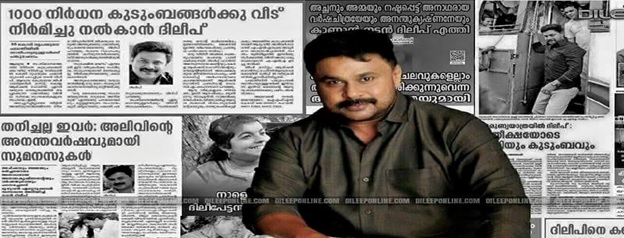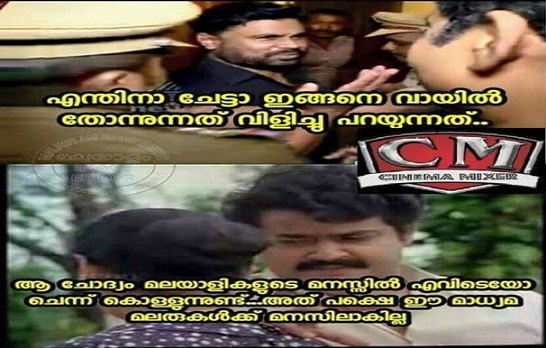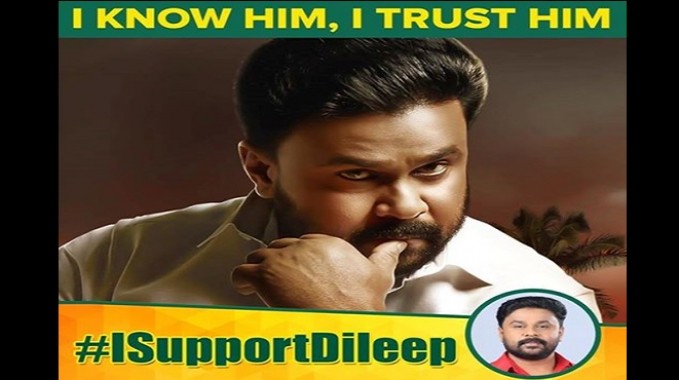Using social media to whitewash sexual assault
Profile picture spreading online in support of Dileep. Software with a frame “I support Dileep” is also being circulated online
Antonio Gramsci’s concept of “manufacturing consent” is often mentioned in political and academic deliberations when the role of the media in propaganda is debated. Though Gramsci’s concepts of hegemony and consent formation mainly discuss the bourgeois tactic of reinforcing the reigning order through institutions such as the media, universities and religion, the concept of “consent manufacturing” has the potential for a wider application.
A few years ago, analyzing the almost similar functions of propaganda, Noam Chomsky delved into how, in a profit-oriented economy, the attitudes and beliefs of the business class are promoted and how they systematically hush the opposition.
These two concepts may sometimes sound like macro-applicable theories but they can be applied at the micro level too, especially as the age we live in has drastically reconstructed the media firmament with the introduction of the Web 2.0 era and social media.
Social media and online news portals have democratised the flow of information to a great extent. Unlike traditional media, the structure and functionality of social media differ in that they are free of the hierarchy of a structured organization. A combination of social networking platforms and online websites and news portals has managed to wield a lethal power in propaganda too. We have seen how Narendra Modi utilized these platforms in the 2014 general election to contribute to mass propaganda.
But can you imagine a sexual assault conspiracy case accused using these platforms to generate mass propaganda to bring out a favourable ‘consent’? Can we think of a situation where PR agencies are deployed to create a social media sympathy wave to hush up the outrage of common people?
If not, please have a thorough look at platforms like Facebook and the reports from the Malayalam media. The major Malayalam news organizations, including Mathrubhumi, Kairali, South Live, Reporter and Newsminute have accused leading Malayalam actor Dileep and his supporters of orchestrating PR to create a sympathy wave in his favour.
It has been hardly one week since Dileep, who is popularly known as “Janapriya Nayagan” (a people’s hero), was arrested in Kochi in connection with the sexual assault on a leading film actress. The police report to the court describes Dileep as the master brain behind the assault in that he hired a gang to carry out the attack. The public outrage against him was enormous and he was booed when he was taken to the court. For the first two days after the arrest, social media was also flooded with angry messages and new accusations against him.
But, all of a sudden, the news feeds of Malayali netizens have been through a turnaround as a campaign in his support started flowing from several online news portals and social media profiles. The suspicion that this was an organized PR effort was inescapable.

A collage explaining Dileep’s charity work on Facebook
A Mathrubhumi article on this issue says that the people around the accused actor have commissioned popular PR agencies to create a sympathy wave for him and repair his damaged public image. The report observes that the Facebook pages operated by these PR agencies are keen to regularly upload memes and videos supporting the accused.
Echoing Mathrubhumi’s theory, other channels such as Reporter TV, Kairali TV, News 18 and news websites like www.thenewsminute.com, www.southlive.in, www.naradanews.com, and www.doolnews.com have also reported that an orchestrated PR campaign is evident across social media.
As the article of Mathrubhumi claims, most of the Facebook pages pumping out messages of support for Dileep were similarly utilized when the actor got divorced from his first wife, the popular actress Manju Warrier. At that time, the pages were mainly used for personal attacks against Warrier.
An article published in www.naradanews.com claims that a camp office of the PR agencies for Dileep is working in Kochi with a group of social media experts to ensure a systematic flow of supportive messages. It says that several Facebook pages, namely “I Support Dileep”, “We Support Dileep”, “Janapriyanayagan” etc., were purposefully used to create a sympathetic atmosphere for the remanded actor.
In fact, when the actor’s bail plea was heard by the Angamali Magistrate Court in Kochi on Saturday, the prosecution mentioned the ongoing PR campaign and said it was an effort to divert public attention from the case. A Mangalam TV report said: “Prosecution objected to the bail plea by stating that this paid campaign is the clear evidence of his influence in society even though he is in jail which can adversely affect the investigation and the victim”.
On the grounds of these new developments, his bail plea was rejected and he was taken back to Aluva Sub Jail.
Meanwhile The Pioneer reported that Kerala police have started tracking the PR agencies working for him. However the police’s opinion on the PR campaign will be key in deciding Dileep’s bail plea in the High Court on Thursday.
The unfolding of this new scenario in Kerala points to the potential of digital media platforms to act as a tool for manufacturing consent in favour of those accused in criminal cases. When social media opened up the closed structures of the traditional media, it simultaneously offered a more ‘democratised’, but also more lethal platform, to pump out organised propaganda at the micro level.

A social media meme supporting Dileep
As the different media firms in Kerala report, this social media campaign has greatly helped Dileep to recover from the initial severe damage and find some supportive voices.
Even though the campaign had an adverse effect on the magistrate, it has without doubt greatly influenced a large number of peripherally thinking netizens and eventually resonated in the social discourse of Kerala.
The initial wave of trenchant criticism and blanket hostility to the actor is gradually changing to a softer attitude towards him among a considerable number of people.
This is a hitherto unprecedented development in a sexual assault case in Kerala. Be it the case of Soumya’s rape and murder or the more recent case of Jisha’s rape and murder, the majority of the people in Kerala had demanded the execution of the accused without a trial.
Now it is interesting to see several Keralites coming forward to defend Dileep. Certainly, this was not a ‘normal’ transition. The role of the social media campaign in this change is evident. If the initial campaign for Dileep was carried out through several pages, now those messages can be seen in individual social media profiles too.
What does this mean? It means that consent manufacturing is underway in the social sphere. But the final word lies with the courts and we have to see if these consent manufacturing efforts pay off in court too.
Rajeesh Kumar T. V. is UGC MRP Research Fellow at the Department of Electronic Media and Mass Communication, Pondicherry University. He can be reached at: rajeeshkumar.t.v@gmail.com







